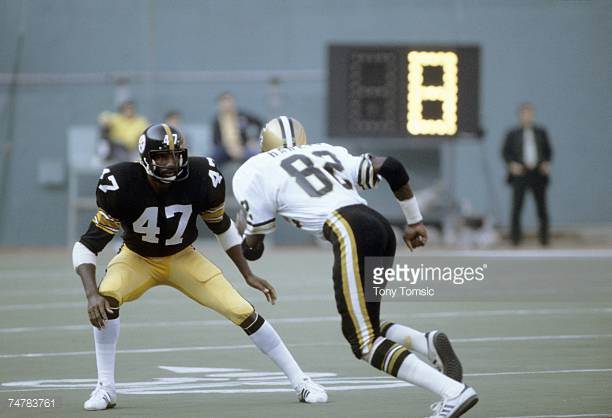The 1970s Pittsburgh Steelers dynasty is one of the most iconic and beloved eras in American professional sports history—and also among the most dominant. Over a six-year span, they won four Super Bowls, a feat that has not since been duplicated.
Largely driven at the time by a dominant defense that features about half a dozen or so Hall of Famers, they were an elite unit from the front to the back, where patrolled the great Mel Blount, one of very few players who have built such a legacy where a rule was informally named after them.
Implemented in 1978, the ‘Mel Blount Rule’ barred contact with wide receivers beginning five yards beyond the line of scrimmage, a rule that helped mark a turning point in the game that began to skew more heavily to an open passing attack.
“When that happened, I took it as an insult”, Blount recently said on All Things Covered with Patrick Peterson and Bryant McFadden, “as if, okay, ‘so you’re putting this rule in because you think that’s the only way I could play, and that’s gonna slow me down’”.
But he stressed that it wasn’t just him that the league was looking to curb, after he had recorded 23 interceptions over the three years prior to the rule’s implementation. There were other rules and tweaks he saw as aimed to disadvantage the Steelers’ defense.
“We were so dominant—not just me and the secondary, but Joe Greene and L.C. Greenwood, Jack Lambert—we were so dominant until they were trying to find ways to slow our defense down. They even took the head slap out”, he said.
Despite the Mel Blount rule, though, he still continued to be a dominant player, making the Pro Bowl in three of the first four years after it came into effect. He registered 17 interceptions in that four-year period, several more than he had in total during his first five seasons.
“I didn’t really like the rule”, he admitted, “but I wanted to prove to them that there was another gear that I could go to another level, so we were able to go and win two more Super Bowls after they changed that rule”.
Blount said that his grandkids think “it’s the coolest thing” that their grandfather has a rule named after him—and frankly, I would, too. And even he has gradually changed his tune on what he originally found insulting, saying, “the older I get, the more I appreciate the fact that I had that kind of impact on the game”.
A third-round pick out of Southern University back in 1970, Blount is one of the greatest cornerbacks to ever play the game—and not just because his playing style brought about a rule change. He finished his playing days with 57 interceptions, but he did so much more than that, which is why he rightfully sits in the Pro Football Hall of Fame along with the many other greats of the past.








